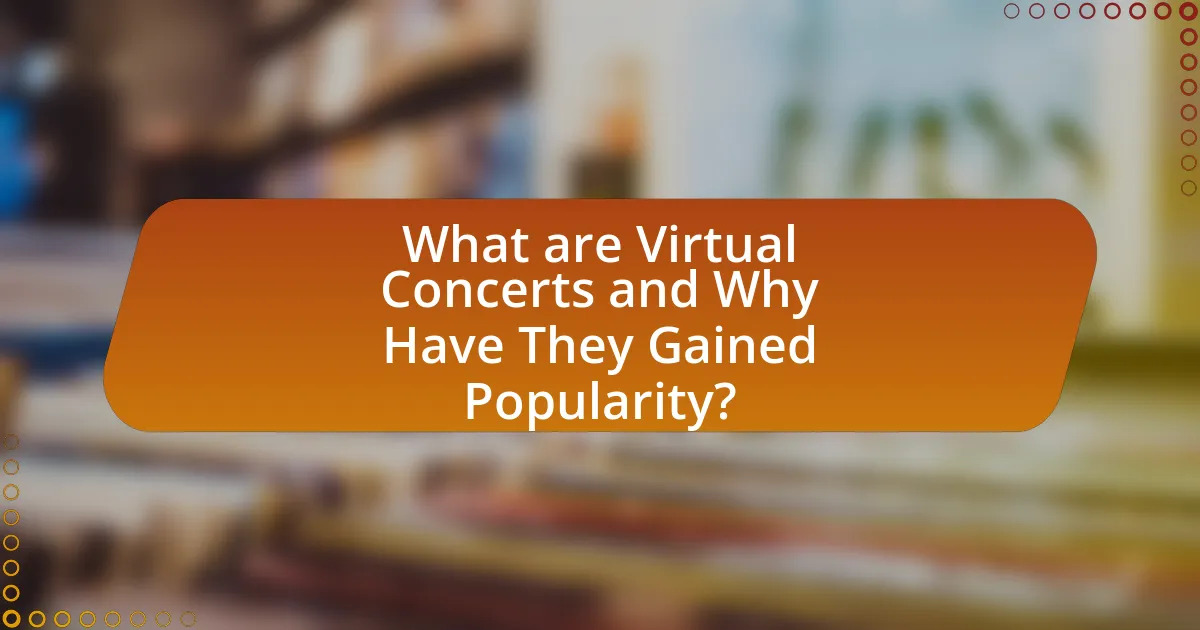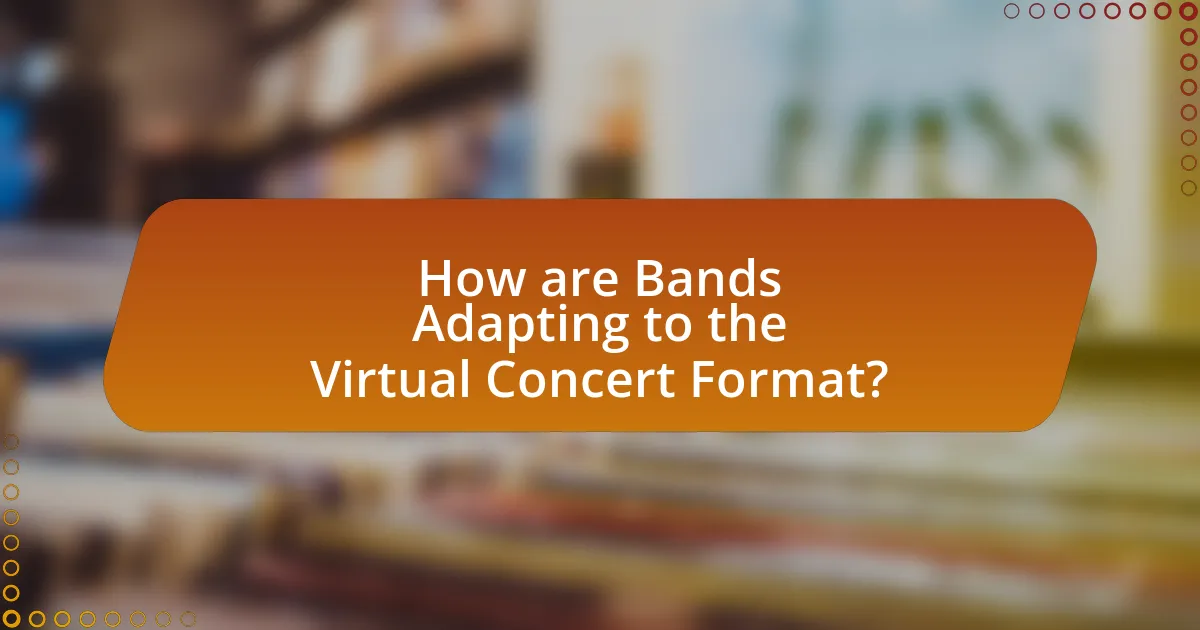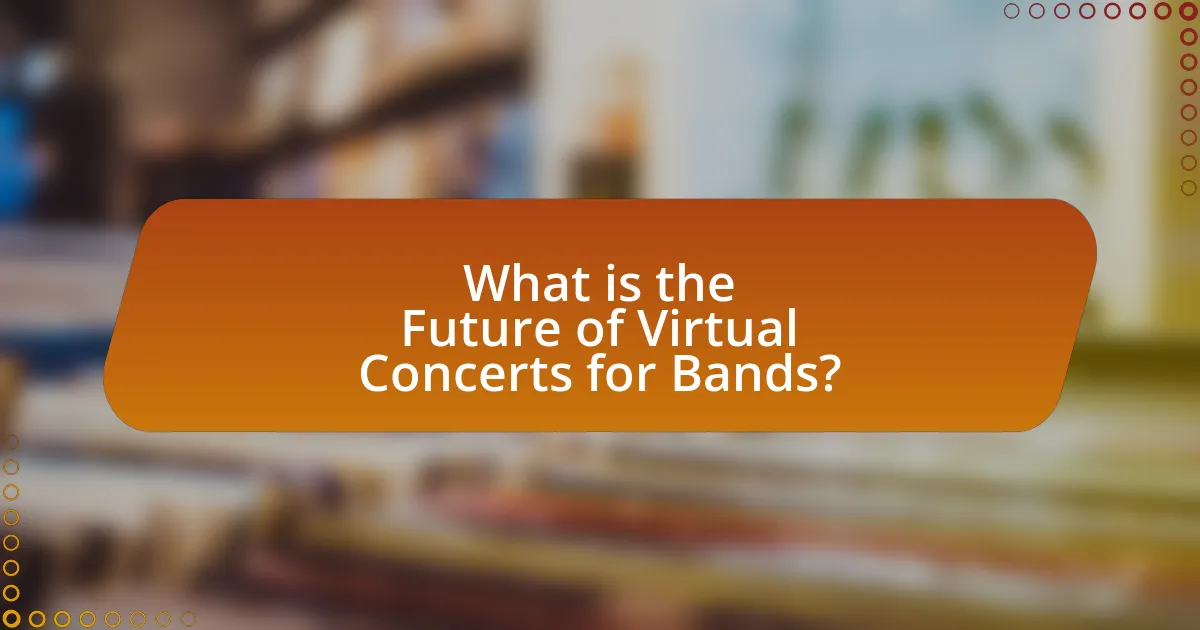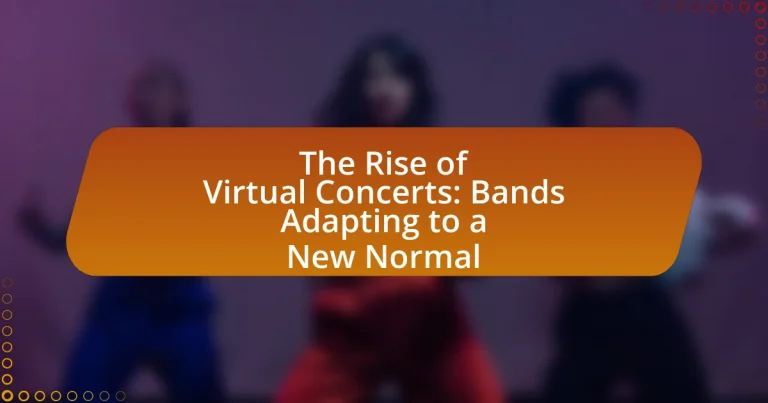Virtual concerts are live performances conducted online, allowing artists to connect with global audiences through digital platforms. Their popularity surged during the COVID-19 pandemic, which restricted in-person gatherings, prompting bands to seek alternative ways to engage fans. The article explores the differences between virtual and traditional concerts, the technologies that enable these performances, and the key features that contribute to their success. It also examines the challenges bands face in this new landscape, the financial advantages of virtual concerts, and the evolving audience preferences that favor online experiences. Finally, the article discusses future trends and best practices for bands to enhance their virtual concert offerings.

What are Virtual Concerts and Why Have They Gained Popularity?
Virtual concerts are live performances that take place online, allowing artists to reach audiences through digital platforms rather than traditional venues. They have gained popularity due to factors such as the COVID-19 pandemic, which restricted in-person gatherings, leading artists to seek alternative ways to connect with fans. Additionally, the accessibility of virtual concerts enables a global audience to participate, often at a lower cost than physical events. According to a report by Pollstar, virtual concerts generated over $100 million in revenue in 2020, highlighting their financial viability and appeal.
How do Virtual Concerts differ from Traditional Concerts?
Virtual concerts differ from traditional concerts primarily in their format and accessibility. Virtual concerts are conducted online, allowing audiences to participate from anywhere with an internet connection, while traditional concerts require physical attendance at a venue. This shift has been accelerated by advancements in technology and the need for social distancing during events like the COVID-19 pandemic, which led to a significant increase in virtual performances. For instance, in 2020, platforms like Twitch and YouTube saw a surge in live-streamed concerts, with artists reaching global audiences without geographical limitations.
What technologies enable Virtual Concerts?
Virtual concerts are enabled by several key technologies, including high-definition video streaming, virtual reality (VR), augmented reality (AR), and interactive platforms. High-definition video streaming allows audiences to experience live performances in real-time with minimal latency, enhancing the overall viewing experience. Virtual reality creates immersive environments where users can feel as if they are physically present at the concert, while augmented reality can enhance live performances with digital effects visible through devices. Interactive platforms facilitate audience engagement through features like live chats, virtual meet-and-greets, and social media integration, allowing fans to connect with artists and each other. These technologies collectively transform the concert experience, making it accessible to a global audience.
What are the key features of a successful Virtual Concert?
Key features of a successful virtual concert include high-quality audio and video production, engaging interactive elements, and effective promotion. High-quality audio and video ensure that the audience experiences the performance as intended, which is crucial for maintaining viewer interest. Engaging interactive elements, such as live chats, Q&A sessions, and virtual meet-and-greets, enhance audience participation and create a sense of community. Effective promotion through social media and targeted marketing strategies is essential for reaching a wider audience and maximizing attendance. These features collectively contribute to the overall success and impact of virtual concerts in the evolving music landscape.
Why did Bands Turn to Virtual Concerts?
Bands turned to virtual concerts primarily to maintain audience engagement and revenue streams during the COVID-19 pandemic, which restricted live performances. As traditional concert venues closed and social distancing measures were implemented, many artists sought digital platforms to reach fans. For instance, a report by Pollstar indicated that the global live music industry lost approximately $30 billion in 2020 due to the pandemic, prompting bands to innovate with virtual performances as a viable alternative. This shift allowed artists to connect with their audience in real-time, often utilizing platforms like YouTube, Twitch, and social media to host live-streamed events, thereby adapting to the new normal of music consumption.
What impact did the COVID-19 pandemic have on live music events?
The COVID-19 pandemic significantly disrupted live music events, leading to widespread cancellations and postponements. In 2020, the live music industry experienced a revenue decline of approximately 75%, as reported by the International Music Industry Report. This drastic reduction was due to health restrictions that prohibited large gatherings, forcing artists and venues to adapt by shifting to virtual concerts. The rise of platforms like YouTube and Twitch facilitated this transition, allowing artists to reach audiences online while maintaining engagement.
How have audience preferences shifted towards Virtual Concerts?
Audience preferences have shifted significantly towards virtual concerts due to increased accessibility and convenience. The COVID-19 pandemic accelerated this trend, as live events were restricted, prompting artists and fans to embrace online platforms. A survey conducted by Eventbrite in 2021 revealed that 67% of respondents enjoyed the flexibility of attending concerts from home, highlighting a preference for virtual experiences over traditional in-person events. Additionally, virtual concerts often feature lower ticket prices and the ability to access performances from global artists, further enhancing their appeal.
What are the benefits of Virtual Concerts for Bands?
Virtual concerts provide bands with increased accessibility to a global audience, allowing them to reach fans who may not be able to attend physical events. This format eliminates geographical barriers, enabling bands to perform for viewers from various locations simultaneously. Additionally, virtual concerts often have lower production costs compared to traditional concerts, allowing bands to allocate resources more efficiently. According to a report by Eventbrite, 70% of event organizers found that virtual events expanded their audience reach, demonstrating the effectiveness of this approach. Furthermore, virtual concerts can enhance fan engagement through interactive features such as live chats and Q&A sessions, fostering a stronger connection between the band and its audience.
How do Virtual Concerts expand a band’s reach?
Virtual concerts expand a band’s reach by allowing them to connect with a global audience without geographical limitations. This format enables bands to stream live performances to fans worldwide, significantly increasing their visibility and accessibility. For instance, during the COVID-19 pandemic, platforms like YouTube and Twitch reported a surge in virtual concert viewership, with some events attracting millions of viewers simultaneously. This broadens the fan base, as individuals who may not have the opportunity to attend physical concerts can now engage with the band online, leading to increased merchandise sales and streaming numbers.
What financial advantages do Virtual Concerts offer?
Virtual concerts offer significant financial advantages, including reduced overhead costs and expanded audience reach. By eliminating expenses associated with physical venues, such as rental fees, staffing, and logistics, artists can retain a larger share of ticket sales. Additionally, virtual concerts can attract global audiences, allowing artists to sell tickets to fans who may not have been able to attend in-person events, thereby increasing revenue potential. For instance, a study by Eventbrite in 2021 indicated that virtual events can generate up to 50% more revenue per attendee compared to traditional concerts, highlighting the financial benefits of this format.

How are Bands Adapting to the Virtual Concert Format?
Bands are adapting to the virtual concert format by utilizing advanced technology and innovative strategies to engage audiences remotely. Many bands are incorporating high-quality streaming services, interactive platforms, and virtual reality experiences to replicate the live concert atmosphere. For instance, some bands have partnered with platforms like Twitch and YouTube Live to reach wider audiences, while others are using social media for real-time interaction during performances. Additionally, data from a 2021 survey by Eventbrite indicated that 67% of musicians reported increased fan engagement through virtual concerts, demonstrating the effectiveness of these adaptations in maintaining audience connection despite physical distance.
What strategies are Bands using to engage their audience online?
Bands are using live streaming, social media interaction, and exclusive content to engage their audience online. Live streaming allows bands to perform in real-time, creating an immersive experience for fans, as seen in events like Travis Scott’s virtual concert in Fortnite, which attracted millions of viewers. Social media platforms enable bands to interact directly with fans through Q&A sessions, polls, and behind-the-scenes content, fostering a sense of community. Additionally, offering exclusive content, such as unreleased tracks or virtual meet-and-greets, incentivizes fans to participate and stay connected, exemplified by initiatives from artists like Billie Eilish, who frequently shares personal updates and engages with her audience on platforms like Instagram.
How do Bands utilize social media to promote Virtual Concerts?
Bands utilize social media to promote virtual concerts by leveraging platforms like Instagram, Facebook, and Twitter to engage with fans and create buzz around their events. They announce concert dates, share behind-the-scenes content, and use live streams to connect with audiences in real-time. For instance, a study by the International Journal of Music Business Research found that 70% of bands reported increased ticket sales through social media promotions. Additionally, bands often collaborate with influencers to reach wider audiences, enhancing visibility and driving ticket sales for virtual events.
What role does audience interaction play in Virtual Concerts?
Audience interaction plays a crucial role in virtual concerts by enhancing engagement and creating a sense of community among viewers. This interaction allows fans to communicate in real-time through chat features, polls, and social media, fostering a shared experience that mimics the atmosphere of live performances. Research indicates that 70% of virtual concert attendees feel more connected to the artist when they can participate in live chats or Q&A sessions during the event, demonstrating the importance of audience involvement in maintaining emotional connections.
What challenges do Bands face in the Virtual Concert landscape?
Bands face several challenges in the virtual concert landscape, primarily including technical issues, audience engagement, and monetization difficulties. Technical issues often arise from unreliable internet connections, inadequate equipment, and software glitches, which can disrupt the performance experience. Audience engagement is another significant challenge, as bands must find innovative ways to connect with viewers who are not physically present, often leading to lower interaction levels compared to live shows. Additionally, monetization poses a problem, as traditional revenue streams like ticket sales and merchandise may not translate effectively to virtual formats, resulting in financial strain for many bands. These challenges highlight the complexities bands encounter as they adapt to the evolving landscape of virtual concerts.
How do technical issues affect the success of Virtual Concerts?
Technical issues significantly hinder the success of virtual concerts by disrupting the audience’s experience and engagement. For instance, problems such as poor audio quality, video lag, and connectivity issues can lead to viewer frustration and decreased attendance. A study by the International Journal of Music Business Research found that 70% of participants reported that technical difficulties negatively impacted their enjoyment of online performances. Furthermore, these issues can diminish the perceived professionalism of the artists, leading to a loss of credibility and potential revenue. Thus, addressing technical challenges is crucial for maximizing the effectiveness and reach of virtual concerts.
What are the common pitfalls Bands encounter when transitioning to Virtual Concerts?
Bands commonly encounter several pitfalls when transitioning to virtual concerts, including inadequate technical preparation, lack of audience engagement, and insufficient marketing strategies. Inadequate technical preparation can lead to poor audio and video quality, which negatively impacts the viewer experience. A study by the International Music Summit in 2021 highlighted that 60% of virtual concerts faced technical issues, affecting audience retention. Lack of audience engagement often results from not adapting performance styles for a digital format, leading to a disconnect with viewers. Additionally, insufficient marketing strategies can limit audience reach, as many bands fail to effectively promote their virtual events, resulting in lower attendance. According to a report by Eventbrite, 70% of virtual events did not meet their attendance goals due to poor marketing efforts.

What is the Future of Virtual Concerts for Bands?
The future of virtual concerts for bands is poised for significant growth and innovation, driven by advancements in technology and changing audience preferences. As of 2023, the global virtual concert market is projected to reach approximately $6 billion by 2027, reflecting a compound annual growth rate of around 23%. This growth is fueled by the increasing accessibility of high-speed internet and the proliferation of virtual reality (VR) and augmented reality (AR) technologies, which enhance the immersive experience for viewers. Additionally, bands are leveraging platforms like Twitch and YouTube to reach wider audiences, allowing for interactive features such as real-time fan engagement and monetization through virtual ticket sales and merchandise. The integration of blockchain technology for secure transactions and digital collectibles further supports this trend, ensuring that bands can maintain revenue streams in a digital-first environment.
How might technology evolve to enhance Virtual Concert experiences?
Technology will evolve to enhance virtual concert experiences through advancements in immersive technologies, such as augmented reality (AR) and virtual reality (VR). These technologies will allow fans to experience concerts in a more interactive and engaging manner, simulating the feeling of being physically present at a live event. For instance, platforms like Oculus and HTC Vive are already developing VR environments that can host live performances, enabling users to interact with the concert space and other attendees. Additionally, improvements in streaming quality, such as 8K video and spatial audio, will provide a more lifelike auditory and visual experience, making virtual concerts more appealing. According to a report by Statista, the global virtual reality market is projected to reach $57.55 billion by 2027, indicating significant investment and innovation in this area, which will directly benefit virtual concert experiences.
What innovations are on the horizon for Virtual Concerts?
Innovations on the horizon for virtual concerts include enhanced immersive experiences through augmented reality (AR) and virtual reality (VR) technologies, which allow fans to engage in interactive environments. Companies like Wave and Oculus are developing platforms that enable artists to perform in virtual spaces where audiences can participate in real-time, creating a sense of presence and community. Additionally, advancements in 3D audio technology are set to improve sound quality, making virtual concerts more lifelike. According to a report by PwC, the global market for virtual events is expected to grow significantly, indicating a strong demand for these innovations.
How could Virtual Reality change the landscape of live music?
Virtual Reality could fundamentally transform the landscape of live music by creating immersive concert experiences that transcend physical limitations. This technology allows fans to attend performances from anywhere in the world, enhancing accessibility and engagement. For instance, platforms like Oculus Venues have already hosted virtual concerts where users can interact with each other and the performers in real-time, simulating the atmosphere of a live event. Additionally, a study by the International Music Summit in 2021 indicated that 70% of music fans expressed interest in attending virtual concerts, highlighting a significant shift in consumer preferences. This shift not only broadens the audience reach for artists but also opens new revenue streams through virtual ticket sales and merchandise.
What best practices should Bands follow for successful Virtual Concerts?
Bands should prioritize high-quality audio and video production for successful virtual concerts. This ensures that the audience experiences the performance as intended, which is crucial for engagement. According to a study by Eventbrite, 80% of attendees value sound quality as a key factor in their enjoyment of virtual events. Additionally, bands should actively promote their virtual concerts across social media platforms to maximize reach and audience participation. Engaging with fans through live chats during the performance can enhance the experience, as 70% of viewers appreciate real-time interaction, according to a survey by Pollstar. Finally, offering exclusive content or merchandise can incentivize ticket sales and create a sense of community among fans.
How can Bands effectively market their Virtual Concerts?
Bands can effectively market their virtual concerts by leveraging social media platforms, engaging with fans through interactive content, and utilizing targeted advertising. Social media allows bands to reach a broad audience, with platforms like Instagram and Facebook enabling live updates and promotional posts that can generate excitement. Engaging content, such as behind-the-scenes videos or Q&A sessions, fosters a connection with fans, making them more likely to attend the concert. Additionally, targeted advertising on platforms like Facebook can help reach specific demographics, increasing ticket sales. According to a report by Eventbrite, 80% of event organizers found social media to be the most effective marketing tool for promoting virtual events, underscoring its importance in reaching potential attendees.
What tips can Bands implement to improve audience engagement during Virtual Concerts?
Bands can improve audience engagement during virtual concerts by incorporating interactive elements such as live Q&A sessions, polls, and real-time chat features. These strategies allow fans to participate actively, fostering a sense of community and connection. For instance, a study by Eventbrite found that 70% of attendees prefer events that include interactive components, indicating that engagement strategies significantly enhance the viewer experience. Additionally, utilizing social media platforms for behind-the-scenes content and encouraging audience participation through hashtags can further amplify engagement, as evidenced by the success of artists like Billie Eilish, who effectively used social media to connect with fans during her virtual performances.


